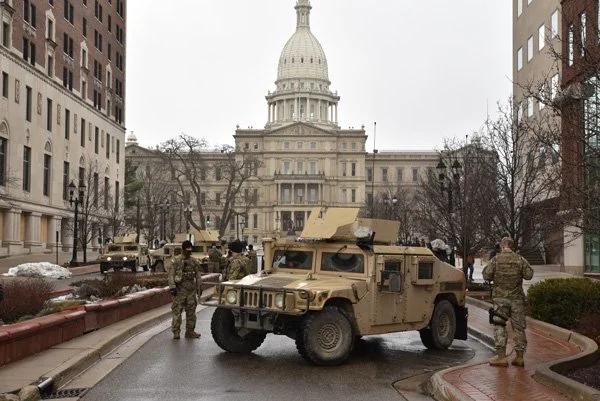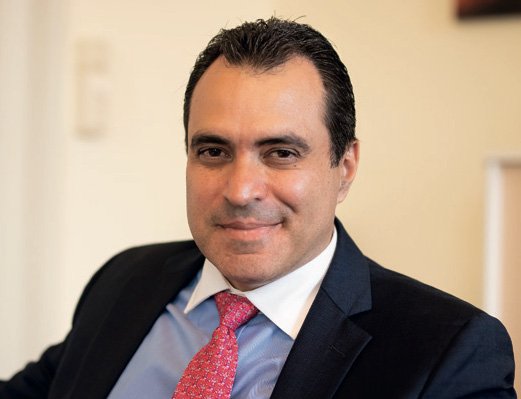On Edge
America’s first Civil War remains the deadliest conflict in the country’s history. Could it happen again?
Read
The United States is “backsliding,” says Kevin Casas-Zamora, head of a Sweden-based think tank that assesses the health of democracies around the world. And it’s the first of two key warning signs that, political scientist Barbara F. Walter argues, could lead America unexpectedly into a second civil war. The other sign: the coalescing of a powerful political party around identity rather than ideology. This week, we hear from Casas-Zamora about why America is becoming a democratic antimodel for self-government, plus Walter spells out her case for why Americans should be very worried about the possibility of armed conflict — and what they can do about it.
Meet
Kevin Casas-Zamora serves as secretary general of the International Institute for Democracy and Electoral Assistance, or IDEA for short. Previously, he was Costa Rica’s second vice president and national planning minister. Casas-Zamora holds a doctorate in political science from the University of Oxford and has taught at Georgetown University, George Washington University, and elsewhere. Follow Casas-Zamora on Twitter @KevinCasasZ.
Barbara F. Walter is the Rohr Professor of International Affairs at the University of California–San Diego’s School of Global Policy and Strategy. A leading expert on political violence and civil war, she serves on the Council on Foreign Relations and has consulted for the World Bank, the United Nations, the U.S. military and the American diplomatic corps. Walter’s popular writing has appeared in the Wall Street Journal and the Washington Post. Her latest book is the bestseller How Civil Wars Start: And How to Stop Them (Crown, 2022). Follow Walter on Twitter @bfwalter.
Walter co-edits the online magazine Political Violence at a Glance, which analyses conflict and protest around the world.
In How Civil War Wars Start, she unpacks the potential of another civil war in the United States, drawing in part on studies conducted by the CIA in other countries. Walter highlights the book’s core argument in this Washington Post essay.
Last November, Walter and two colleagues, Lise Morjé Howard and V. Page Fortna, argued in Foreign Affairs that the UN deserves more credit and greater financial support for its peacekeeping missions.
Read more from Walter’s extensive scholarly and popular oeuvre.
As a senior fellow at the Brookings Institution, Casas-Zamora wrote op-eds on political corruption and campaign finance in Latin America. He also edited a book on crime syndicates in the region and their ties to politicians: Dangerous Liaisons.
Casas-Zamora’s doctoral thesis won the Jean Blondel Prize in 2004 and was published by the European Consortium for Political Research. It’s titled Paying for Democracy: Political Finance and State Funding for Parties.
Watch him call on world leaders to defend democracy amid the many challenges posed by the coronavirus pandemic.
Learn
In 2021, International IDEA put out its most recent Global State of Democracy Report. In it, the United States was downgraded to “backsliding” among world democracies for the first time. The main reason: “declines in civil liberties and checks on government.”
The attack last January on the U.S. Capitol contributed to that designation. But the report also considers the course of democracy over several years, noting that police violence during the Black Lives Matter protests in 2020, as well as the lack of appetite in Congress to check then-President Trump’s power, was alarming.
Another major factor cited in the report was the Republican Party’s “semi-loyal” participation in American political life. The GOP recently censured its own members for refusing to characterize the Jan. 6 insurrection as “legitimate political discourse.”
Republican leaders have also gotten on board with questioning the results of the 2020 election and attempts to suppress voting rights.
A 26-year-old plotter in the scheme to abduct Gov. Whitmer pleaded guilty, turned state’s witness, and testified last week that his co-conspirators hoped to stop President Biden’s election and foment a broad rebellion.
The four defendants in that federal trial in Grand Rapids, Mich., are facing life in prison if convicted. Their lawyers are arguing entrapment. Seven other men are accused in state court of abetting the plot.
At least two of the 14 men charged in the plot participated in April 2020 in the storming of Michigan’s state capitol — what some now see as a “dress rehearsal” for the siege in Washington the following January.
Heard on the show
We pulled a few tracks from Ketsa — the venerable Free Music Archive producers based in the UK — for our intro piece with Casas-Zamora. You heard “Night-Shadows” (2022, Spiral Forecast) “Tumbleweeds” (2021, Metaphysics) and “Progress” (2021, Dimensions).











